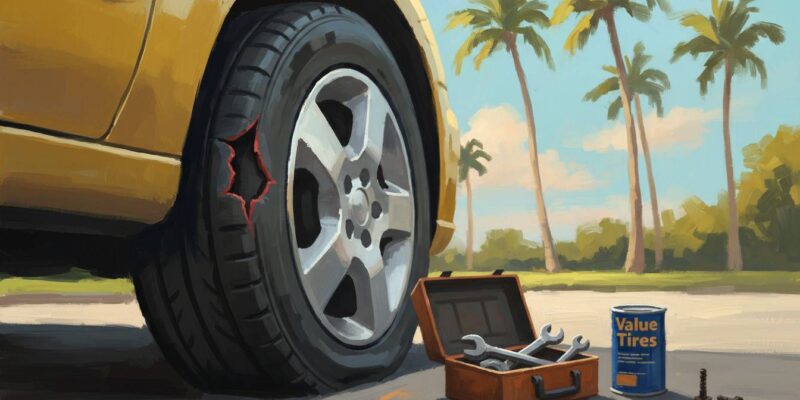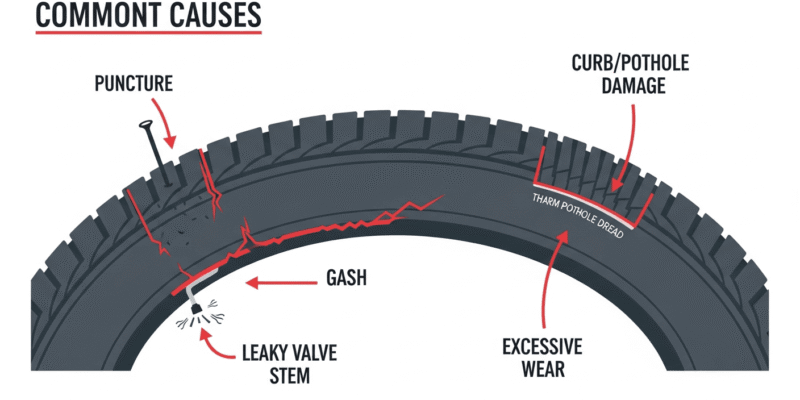Whether you’re a seasoned driver or a beginner hitting the road for the first time, one thing remains crucial for a smooth and safe journey – well-maintained tires. Your vehicle’s tires play a pivotal role in ensuring optimal performance, handling, and safety. Regular tire replacements are not just about complying with vehicle maintenance schedules; they can significantly impact your driving experience and overall vehicle longevity.
In this comprehensive guide, we’ll walk you through everything you need to know about tire replacements, from understanding the signs that indicate it’s time for new tires to making informed choices based on your driving needs. We’ll equip you with the knowledge to confidently upgrade your drive, ensuring that you stay ahead in the race while leaving your competition behind.
Table of Contents
ToggleImportance of Well-Maintained Tires
Having well-maintained tires is of utmost importance for any vehicle owner, regardless of their driving experience. Your vehicle’s tires are the only point of contact with the road, making them critical for several reasons:
1. Optimal Performance
Well-maintained tires contribute to optimal performance on the road. Properly inflated tires with adequate tread depth ensure smoother handling, improved fuel efficiency, and better braking capabilities. These factors collectively enhance the overall driving experience, providing you with a sense of control and confidence behind the wheel.
2. Safety First
When it comes to road safety, tires play a crucial role. Worn-out or damaged tires increase the risk of accidents, especially during adverse weather conditions like rain, snow, or ice. With well-maintained tires, you can significantly reduce the chances of hydroplaning and maintain better traction, ensuring safer journeys for you and your passengers.
3. Longevity of Your Investment
Investing in a set of quality tires is an investment in the long-term health of your vehicle. Regular tire maintenance and timely replacements extend the life of your tires, saving you from the expense of premature replacements. Additionally, well-maintained tires also put less strain on other vehicle components, leading to extended overall vehicle longevity.
4. Improved Fuel Efficiency
Did you know that well-maintained tires can positively impact your vehicle’s fuel efficiency? Underinflated tires cause increased rolling resistance, leading to reduced fuel mileage. On the other hand, properly inflated and well-aligned tires minimize resistance, helping you save money on fuel costs in the long run.
5. Enhanced Driving Comfort
Tires that are in good condition provide a smoother and more comfortable ride. You’ll notice reduced vibrations and noise, making your driving experience more pleasant, especially during long journeys.
6. Eco-Friendly Practices
Maintaining your tires contributes to eco-friendly practices. Properly inflated tires help reduce greenhouse gas emissions by optimizing fuel efficiency. By taking care of your tires, you’re playing a part in promoting sustainable driving practices.
Signs It’s Time for Tire Replacements
Regularly inspecting your vehicle’s tires is crucial to ensure their safety and optimal performance. Here are some signs that indicate it’s time for tire replacements:
1. Tread Wear Indicators
Tires are designed with tread wear indicators, which are small rubber bars located in the tire grooves. As the tread wears down over time, these indicators become visible. If you notice that the tread has worn down to the level of these indicators, it’s a clear sign that your tires have reached the end of their lifespan and should be replaced.
2. Uneven Tread Wear
Inspect your tires for any signs of uneven tread wear. Uneven wear across the tire surface could be indicative of alignment issues, suspension problems, or improper tire inflation. Addressing these issues promptly is essential to prevent further damage and ensure even wear on your new set of tires.
3. Cracks, Bulges, or Punctures
Regularly examine your tires for any visible signs of damage, such as cracks, bulges, or punctures. These issues compromise the structural integrity of the tire, making them more susceptible to blowouts or sudden failures. If you spot any of these signs, it’s time to replace the affected tire immediately.
4. Excessive Vibration
If you experience excessive vibrations while driving, it could be an indication of tire-related problems. Vibrations can result from unbalanced or damaged tires. In such cases, it’s essential to have your tires inspected by a professional and consider replacements if necessary.
5. Age of the Tires
Regardless of their tread depth, tires age over time due to various factors, including exposure to sunlight, temperature fluctuations, and driving conditions. If your tires are more than six years old, it’s recommended to replace them, even if they appear to be in good condition. Aging tires may suffer from internal damage that’s not easily visible.
6. Decreased Traction
If you notice a decrease in traction, especially in wet or slippery conditions, it’s a sign that your tires are losing their grip on the road. Reduced traction compromises your vehicle’s ability to handle and brake safely, posing a significant risk to your safety and that of others on the road.
7. Persistent Air Loss
Frequent or persistent air loss in one or more of your tires could indicate a leak or puncture. While it’s possible to repair some punctures, severe damage or sidewall punctures may require tire replacements.
8. Unusual Noises
Unusual noises coming from your tires, such as thumping or excessive road noise, may suggest tire issues that need attention. In some cases, tire replacements may be necessary to resolve the problem and ensure a smooth and quiet ride.
Regularly inspecting your tires and being mindful of these signs will help you stay ahead in maintaining a safe and well-performing vehicle. When in doubt about the condition of your tires, always consult a professional tire technician for a thorough inspection and appropriate recommendations. Remember, well-maintained tires are essential for a safe and enjoyable driving experience.
Choosing the Right Tires for Your Needs
Selecting the perfect set of tires might seem overwhelming with the plethora of options available. However, understanding your driving habits and the types of tires available can simplify the process. Here are some common tire types to consider:
1. All-Season Tires
All-season tires are designed to provide adequate performance in various weather conditions, making them a popular choice for everyday driving.
Advantages:
- Versatility: All-season tires can handle both dry and wet roads, providing reasonable traction in moderate snow conditions.
- Smooth Ride: They offer a comfortable and quiet ride due to their well-rounded design.
Considerations:
Limited Performance: While all-season tires provide decent performance in various conditions, they may not excel in extreme weather conditions like heavy snow or ice.
2. Summer Tires
Summer tires are engineered to deliver top-notch performance in warm weather and dry road conditions.
Advantages:
- Excellent Handling: Summer tires offer superior grip and responsiveness, ensuring precise control during cornering and braking.
- Enhanced Traction: They provide optimal traction on dry roads, enhancing overall driving performance.
Considerations:
- Unsuitable for Winter: Summer tires are not suitable for cold weather conditions, as their rubber compound hardens in low temperatures, reducing traction on icy or snowy surfaces.
3. Winter Tires
Winter tires, also known as snow tires, are specifically designed to handle cold temperatures, ice, and snow.
Advantages:
- Superior Traction: Winter tires feature a softer rubber compound and aggressive tread patterns, providing exceptional grip on snow and ice.
- Increased Safety: They significantly reduce the risk of skidding or sliding in harsh winter conditions, ensuring safer journeys.
Considerations:
- Limited Performance in Warm Weather: Winter tires wear out faster in warm weather and are not suitable for year-round use.
4. Performance Tires
Performance tires are engineered for sporty and high-performance vehicles, focusing on providing maximum grip and handling.
Advantages:
- Enhanced Performance: These tires excel in cornering, braking, and acceleration, enhancing the overall driving experience.
- Aesthetics: Performance tires often come with stylish designs that complement the appearance of sporty vehicles.
Considerations:
- Reduced Tread Life: Due to their softer rubber compound, performance tires tend to wear out faster than other tire types.
5. All-Terrain Tires
All-terrain tires are designed for off-road enthusiasts and drivers who frequently encounter rough terrains.
Advantages:
- Versatility: All-terrain tires offer excellent traction on various surfaces, including gravel, mud, and rocky terrain.
- Durability: They are built to withstand rough conditions, making them suitable for adventurous journeys.
Considerations:
- Noisy Ride: All-terrain tires may produce more road noise compared to standard highway tires due to their aggressive tread patterns.
Making the Right Choice
To choose the right tires for your needs, consider the following factors:
1. Driving Conditions
Assess the typical weather and road conditions you encounter. If you live in an area with harsh winters, investing in winter tires is essential for enhanced safety.
2. Driving Style
Consider your driving habits and preferences. If you enjoy spirited driving and prioritize performance, performance tires might be the best fit for you.
3. Vehicle Type
Your vehicle’s make and model can influence the type of tires it requires. Check the manufacturer’s recommendations for the most suitable tire options.
4. Budget
Different tire types come at varying price points. Balance your budget with your desired tire features to find the best fit.
5. Longevity
Consider the expected lifespan of the tires you’re considering. Some tires may be more durable and have longer tread life, providing better value for money in the long run.
The Importance of Professional Installation
Once you’ve chosen the right set of tires for your needs, the next crucial step is proper installation. Professional installation ensures that your tires are balanced, aligned, and mounted correctly, maximizing their performance and longevity.
1. Proper Balancing
Balancing your tires evenly distributes the weight, preventing uneven wear and vibrations that can affect your vehicle’s ride quality.
2. Precise Alignment
Wheel alignment ensures that all four tires are properly oriented, resulting in better handling, improved fuel efficiency, and reduced tire wear.
3. Correct Mounting
Improper tire mounting can lead to air leaks and reduced performance. Professional technicians use the right equipment to mount the tires securely on your vehicle.
Maintaining Your Tires for Longevity
To get the most out of your investment in tires, regular maintenance is key. Follow these essential tips to prolong the life of your tires:
1. Proper Balancing
During professional installation, the technician carefully balances each tire. Balancing involves equalizing the weight distribution of the tire and wheel assembly. Properly balanced tires reduce vibrations, ensuring a smooth and comfortable ride. Unbalanced tires can lead to uneven tread wear, decreased fuel efficiency, and increased stress on your vehicle’s suspension components.
2. Precise Alignment
A crucial aspect of professional tire installation is ensuring that your vehicle’s wheels are precisely aligned. Wheel alignment ensures that all four tires are oriented correctly, both relative to each other and to the road surface. Proper alignment enhances steering response, improves handling, and reduces tire wear. It also ensures that your vehicle tracks straight, providing better overall control and safety.
3. Correct Mounting
Professional technicians use specialized equipment to mount the tires securely onto the wheels. Proper mounting is essential to prevent air leaks and ensure the tire adheres tightly to the wheel rim. Improperly mounted tires can lead to air loss, reduced performance, and potential safety hazards. With professional installation, you can trust that your tires are mounted securely, minimizing the risk of issues down the road.
4. Preventing Damage
Experienced technicians exercise care during the installation process, minimizing the risk of damaging the tires or wheels. Scratches, cuts, or nicks during installation can compromise the tire’s integrity and lead to air leaks or premature failure. Professional installation mitigates these risks, protecting your investment in quality tires.
5. Complying with Manufacturer Recommendations
Manufacturers often provide specific guidelines and torque settings for tire installation. Professional technicians follow these recommendations meticulously to ensure that the tires are installed to the manufacturer’s specifications. This adherence to guidelines ensures that your tires perform optimally and maintain their warranty coverage.
6. Safety Assurance
Properly installed tires contribute to your vehicle’s overall safety. Knowing that your tires have been professionally mounted, balanced, and aligned gives you peace of mind while driving, especially during long journeys or challenging road conditions.
7. Maximizing Tire Lifespan
Professional installation promotes even tread wear, which extends the life of your tires. Even wear ensures that you get the most out of your investment, as the tires wear out more uniformly and require fewer replacements over time.
Conclusion
Your vehicle’s tires are more than just round rubber objects; they are essential components that directly impact your driving experience, safety, and performance. Regular tire replacements and proper maintenance are fundamental to keep your vehicle in top shape while ensuring a smooth and safe journey.
Investing in quality tires is essential for your safety and driving experience, but it’s equally vital to ensure they are professionally installed. Professional installation guarantees proper balancing, precise alignment, correct mounting, and adherence to manufacturer guidelines, ultimately maximizing your tire’s performance and longevity. By entrusting your tire installation to skilled technicians, you not only enhance your driving experience but also ensure the safety and well-being of yourself and your passengers. Professional installation is a wise investment that pays off in the form of a smoother ride, extended tire lifespan, and greater peace of mind on the road.




